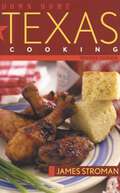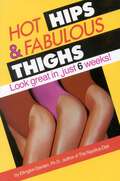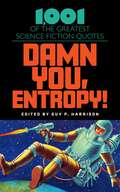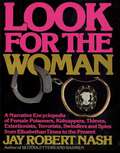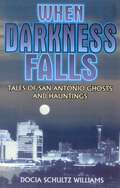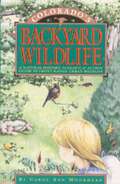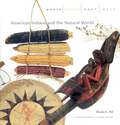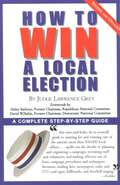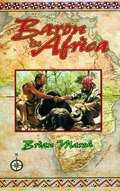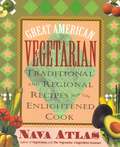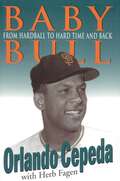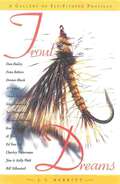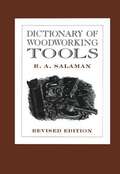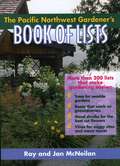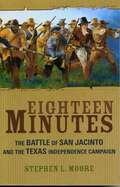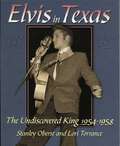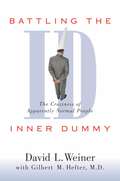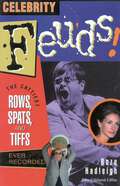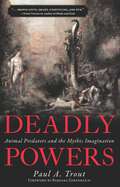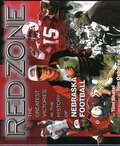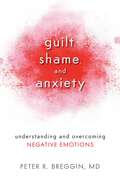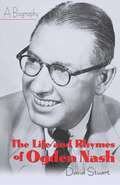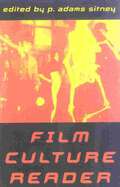- Table View
- List View
Down Home Texas Cooking
by James StromanTreat yourself to a genuine taste of Texas with this collection of authentic and savory dishes as broad as the Texas sky and as hearty as a cowboy's laugh. James Stroman traveled the Lone Star State and collected the special recipes that have become traditional mealtime favorites with Texas families. These best-loved dishes include spicy Creole cuisine, splendid Tex-Mex offerings, classic Texas fare, and delectable Gulf Coast seafood. And for the carb-counters out there, a special icon has been added to draw attention to the low and no-carb recipes. From hors d'oeuvres to dessert, the recipes in Down Home Texas Cooking are as rich and varied as Texas itself.
Hot Hips and Fabulous Thighs: Look Great in Just 6 Weeks
by Ellington DardenA guaranteed program for women focusing on their most troublesome areas: hips, thighs, and buttocks.
Damn You, Entropy!: 1,001 of the Greatest Science Fiction Quotes
by Guy P. HarrisonScience fiction has hosted some of the greatest minds and most innovative thinkers in human history. From H.G. Wells to Octavia Butler, Star Trek to Star Wars, in books, on television, and at the movies, science fiction has shaped our future, pushed the limits of human imagination, and guided us within ourselves to examine universal truths of life. In this smartly curated book, author Guy P. Harrison collects 1,001 of the most influential and transformative quotations spanning four centuries of sci-fi, such as:&“Better to make a good future than predict a bad one.&”―Isaac Asimov, Prelude to Foundation, 1988 novel&“Hope clouds observation.&”―Frank Herbert, Dune, 1965 novel&“No amount of money ever bought a second of time.&”―Avengers: Endgame, 2019 film, written by Christopher Markus and Stephen McFeelyWhether you are a Dr. Who superfan, a diehard sci-fi reader, or an outer space film buff—or are simply curious about the cosmos—Damn You, Entropy! is an essential addition to every science fiction fan&’s library.
Look for the Woman: A Narrative Encyclopedia of Female Prisoners, Kidnappers, Thieves, Extortionists, Terrorists, Swindlers and Spies from Elizabethan Times to the Present
by Jay Robert NashA revealing survey of female criminals through the centuries includes an intriguing progression of female poisoners, kidnappers, extortionists, terrorists, swindlers and spies.
The Tarpon Book: A Complete Angler's Guide Book 3
by Frank SargeantLoaded with tactics from the nation's leading tarpon anglers, The Tarpon Book can turn the beginner into a seasoned pro, With tips from more than 30 world-class tarpon fishermen, The Tarpon Book is must reading for anyone who hopes to take on the most spectacular of saltwater fish, the silver king.
When Darkness Falls: Tales of San Antonio Ghosts and Hauntings
by Docia Shultz WilliamsOnce again, well-known ghost story writer Docia Williams brings us an all-new book about recent ghost sightings and mysterious happenings in the Alamo City. A chilling book for those wanting a guide to places where spirits are known to rendezvous or for those who just like a good ghost story.
Colorado's Backyard Wildlife: A Natural History, Ecology, & Action Guide to Front Range Urban Wildlife
by Carol Ann MoorheadIntroduces a variety of animals and habitats that exist along Colorado's Front Range. Ages 12 and up.
North, South, East, West: American Indians and the Natural World
by Marsha C. BolVibrant photographs and moving quotes give tangible expression to a rich heritage of Native American beliefs and customs, and demonstrate how Native groups maintain viable cultures within mondern-day America.
How To Win A Local Election, Revised: A Complete Step-by-Step Guide
by M. Andrew GreyRevised and updated, this is the most practical, most detailed handbook ever published on the techniques and approaches you need to run a successful campaign for any local office.
Baron in Africa: The Remarkable Adventures of Werner Von Alvensleben
by Brian MarshWerner von Alvensleben comes from a long line of German aristocrats. Yet far from enjoying a privileged and pampered existence, his life plays like a Hollywood adventure movie. Imprisoned in Zimbabwe during World War II, von Alvensleben escaped by digging underneath an electric fence in the rain and making his way by foot to Mozambique.After founding the famous Safarilandia hunting company, he guided a list of hunting luminaries that included Jack O'Connor and Robert Ruark (who found out he could not bribe Werner!). Follow his career as he attacks a man-eating lion, kills a full-grown buffalo with a spear, and hunts for elephant and ivory in some of the densest brush in Africa. Adventure and experience were what counted to the man they call "Baron," not money or fame; indeed, in the end he left Mozambique with barely more than the clothes on his back.
Great American Vegetarian: Traditional and Regional Recipes for the Enlightened Cook
by Nava AtlasThis charming vegetarian cookbook is chock-full of delicious recipes and sprinkled with bits of historical lore and literary references. The classic dishes found within focus on farm fresh ingredients and traditional flavors updated with a healthy twist.
Baby Bull: From Hardball to Hard Time and Back
by Orlando CepedaOrlando Cepeda enjoyed a stellar baseball career in the late fifties and throughout the sixties, but after it ended in the mid-seventies, his life fell apart. In Baby Bull, Cepeda shares his story for the first time. He reflects on his baseball career and shares his twenty-year struggle to rebuild his life and regain his reputation.
Trout Dreams
by James MerrittA significant part of what has made fly-fishing such a widely read-about sporting activity is that it is populated with a world of colorful individuals. Merritt, who has written for numerous sporting magazines, assembles a collection of profiles of many of the "big names" in the fly-fishing world of our day. There is also a personal touch because Merritt structures each profile around his opportunity to fish with these individuals. Some of the individuals he fished with include Joe Humphreys, former fly-fishing instructor for Penn State University, and Seattle area filmmakers Jim and Kelly Watt who are also the hosts of ESPN's "Fly-Fishing Video Magazine" TV series. Practical knowledge and philosophical wisdom flow from the experiences collected in Trout Dreams.
Dictionary of Woodworking Tools
by R. A. SalamanSince its first publication in 1975, R.A. Salaman's Dictionary of Woodworking Tools has come to be recognized as a definitive pioneering reference work, one of unparalleled value to craftsmen, collectors, antique dealers and all who are interested in the subject of woodworking tools and their uses. His rich language describes and explains the tools, not only of the more obvious woodworking trades (such as the cabinetmaker, chairmaker, joiner, coachbuilder, cooper, shipwright, plane maker, wheelwright and instrument maker) but of the less obvious trades as well, such as broom and brush makers, tree feller, hoop maker, upholsterer, millwright, coffin maker and window maker. The present edition is a substantial enlargement of the original work, revised and updated by Philip Walker, himself an authoritative historian-collector of tools
The Pacific Northwest Gardener's Book of Lists
by Ray McNeilan Jan McNeilanThe Pacific Northwest Gardener's Book of Lists is the definitive gardening guide for gardeners in this area. Included are such interesting lists as: annuals that attract beneficial insects, perennials for autumn color, hostas for full sun, annuals for dry shade, trees with weeping character, and more.
Eighteen Minutes: The Battle of San Jacinto and the Texas Independence Campaign
by Stephen L. MooreIt was the decisive eighteen-minute Battle of San Jacinto where the famous words "Remember the Alamo!" were first shouted. In Eighteen Minutes, Stephen L. Moore describes the momentous battle that established the independent Lone Star Republic. Told largely through the eyes of the participants, the recollections included here are words from over 120 Texan and Mexican soldiers. The book follows General Sam Houston as he takes command of the Texas Volunteers to lead them to victory six weeks after the fall of the Alamo at San Jacinto, the town since known as the birthplace of Texas liberty. The battle and its aftermath are covered in great detail and include the capture of Santa Anna, the "Yellow Rose" controversy, and the death of a woman on the battlefield. Special features include rosters of all Texans involved in the battle, a list of casualties, and the details on other companies involved in the campaign. Eighteen Minutes is a comprehensive history of how revenge for the defeat of the Alamo was at last achieved.
Elvis In Texas: The Undiscovered King 1954-1958
by Stanley Oberst Lori TorranceElvis Presley and his two faithful sidekicks tore up Texas highways, crisscrossing the state, always late for their next high school hop, car dealership opening, or Lion's Club fund raiser.
Battling the Inner Dummy: The Craziness of Apparently Normal People
by David L. WeinerFrom the sexcapades of Bill Clinton to the unbelievable story of Hugh Grant and the prostitute; from the 15-year-old who weighs only 82 pounds but believes she's obese, to the professor who screams profanities at other drivers in snarled traffic--we wonder out loud, "What are they thinking?!" What drives so many apparently normal, intelligent people to act irrationally, harming themselves and others? According to Sigmund Freud, such behavior may be caused by the "id," our built-in mental invitation to everything from dangerous fun to horrendous acts of irrationality. For popular psychology writer David Weiner, "id" stands for "Inner Dummy," the part of the brain that we must come to understand if we are ever to know why we do foolish, irrational, and compulsive things. Drawing on the groundbreaking theories of evolutionary psychology, Battling the Inner Dummy localizes the source of our irrationality in the limbic id-the most primitive part of our brain that endlessly thirsts for status, sex, territory, nurturance, and survival. "We become captured by these drives," Weiner says. "By understanding our Inner Dummy, we can avoid disasters in our own lives." Along with sound advice from clinical psychiatrist Dr. Gilbert Hefter on how to handle our own Inner Dummies with built-in rewards and punishments, Weiner brilliantly interweaves delightful, imagined conversations with Freud and staffers at a mythical advertising agency, who have been given the assignment of communicating the nature of the id's irrationalities to the general public (e.g., t-shirts that say, "Would someone please fix my Inner Dummy before I fall in love with another idiot?" and a bathroom scale that allows you to weigh eight pounds less each time you use it). This inviting, humorous romp with Inner Dummies who have made the news illustrates how we can apply "ID prevention" in our daily lives and includes all the major strategies science and medicine have developed over the years to counter Inner Dummies that threaten our well-being. See how well you're handling your own inner dummy by taking the quizzes at www.innerdummy.com.
Celebrity Feuds!: The Cattiest Rows, Spats, and Tiffs Ever Recorded
by Boze HadleighCelebrity Feuds! dishes the dirt with in-depth stories of every word uttered, letter written, or fist swung from the cantankerous stars' first calamitous encounters to their deathbed declarations. Exposing the shocking tactics of the most bitter rivals in the entertainment industry and the vindictive, unseen ire of our favorite stars, this book reveals Hollywood with all its claws bared.
Deadly Powers: Animal Predators and the Mythic Imagination
by Paul A. TroutIn this illuminating and evocative exploration of the origin and function of storytelling, the author goes beyond the work of mythologist Joseph Campbell, arguing that mythmaking evolved as a cultural survival strategy for coping with the constant fear of being killed and eaten by predators. Beginning nearly two million years ago in the Pleistocene era, the first stories, Trout argues, functioned as alarm calls, warning fellow group members about the carnivores lurking in the surroundings. At the earliest period, before the development of language, these rudimentary "stories" would have been acted out. When language appeared with the evolution of the ancestral human brain, stories were recited, memorized, and much later written down as the often bone-chilling myths that have survived to this day. This book takes the reader through the landscape of world mythology to show how our more recent ancestors created myths that portrayed animal predators in four basic ways: as monsters, as gods, as benefactors, and as role models. Each incarnation is a variation of the fear-management technique that enabled early humans not only to survive but to overcome their potentially incapacitating fear of predators. In the final chapter, Trout explores the ways in which our visceral fear of predators is played out in the movies, where both animal and human predators serve to probe and revitalize our capacity to detect and survive danger. Anyone with an interest in mythology, archaeology, folk tales, and the origins of contemporary storytelling will find this book an exciting and provocative exploration into the natural and psychological forces that shaped human culture and gave rise to storytelling and mythmaking.
Red Zone: The Greatest Victories in the History of Nebraska Football
by Tom ShatelRed Zone: The Greatest Victories in the History of Nebraska Footbal takes you back to the colorful characters and breathing moments that made Nebraska football the greatest program in college football and the pride of the state of Nebraska.
The Yarn of Old Harbour Town
by W. Clark RussellThis is the tale of the kidnapping of a sea captain's daughter, his frantic pursuit of her, and a fight in the English Channel. Enlivening the novel is an unforgettable cameo appearance by Admiral Lord Nelson.
Guilt, Shame, and Anxiety: Understanding and Overcoming Negative Emotions
by Peter R. BregginWith the first unified theory of guilt, shame, and anxiety, this pioneering psychiatrist and critic of psychiatric diagnoses and drugs examines the causes and effects of psychological and emotional suffering from the perspective of biological evolution, child development, and mature adult decision-making. Drawing on evolution, neuroscience, and decades of clinical experience, Dr. Breggin analyzes what he calls our negative legacy emotions-the painful emotional heritage that encumbers all human beings. The author marshals evidence that we evolved as the most violent and yet most empathic creatures on Earth. Evolution dealt with this species-threatening conflict between our violence and our close-knit social life by building guilt, shame, and anxiety into our genes. These inhibiting emotions were needed prehistorically to control our self-assertiveness and aggression within intimate family and clan relationships. Dr. Breggin shows how guilt, shame, and anxiety eventually became self-defeating and demoralizing legacies from our primitive past that no longer play any useful or positive role in mature adult life. He then guides the reader through the Three Steps to Emotional Freedom, starting with how to identify negative legacy emotions and then how to reject their control over us. Finally, he describes how to triumph over and transcend guilt, shame, and anxiety on the way to greater emotional freedom and a more rational, loving, and productive life.
The Life and Rhymes of Ogden Nash: A Biography
by David StuartOgden Nash was a rare poet. He celebrated the ordinary with delight and curiosity: husbands and wives at work, children at play, a society in motion. He studied popular culture with a penetrating eye and wrote about America, its icons, habits, and affectations with humor and levity. He struggled with comparisons to &“serious&” poets, those heroes of the canon who abandoned the rhyme and meter that Nash found crucial to his style of writing. His witty, insightful, and graceful vignettes captured those moments in life that defy heavy-handed treatment. Nash did not live out the stereotype of the aloof poet-recluse. In addition to his writing, Nash pursued publishing, screenwriting, and a rigorous lecture circuit. This self-styled [pet of wide appeal appeared in newspapers and magazines found in homes across the country, accessible publications such as Life, New Yorker, Cosmopolitan, SportsIllustrated, Reader&’sDigest, and McCall&’s. At a time when children&’s literature meant Winnie-the-Pooh, Nash produced verses for and about young people that amused, educated, and more importantly, didn&’t pander or lecture. These poems and collections, including Custard the Dragon, The New Nutcracker Suite and Other Innocent Verses, A Boy Is a Boy, and Girls Are Silly, were classics of the genre. Nash left behind an invaluable body of work: charming, clever, and utterly unique.
Film Culture Reader
by P. Adams SitneyThis compilation from Film Culture magazine—the pioneering periodical in avant-garde film commentary—includes contributors like Charles Boultenhouse, Erich von Stroheim, Michael McClure, Stan Brakhage, Annette Michelson, Arthur Miller, Dylan Thomas, Andrew Sarris, Rudolph Arnheim, Jonas Mekas, and Parker Tyler. This collection covers a range of topics in twentieth century cinema, from the Auteur Theory to the commercial cinema, from Orson Welles to Kenneth Anger.
